新目标八年级上册英语全册课文重难点讲解(全)
八年级英语上册--unit 1-10 课文重难点讲解
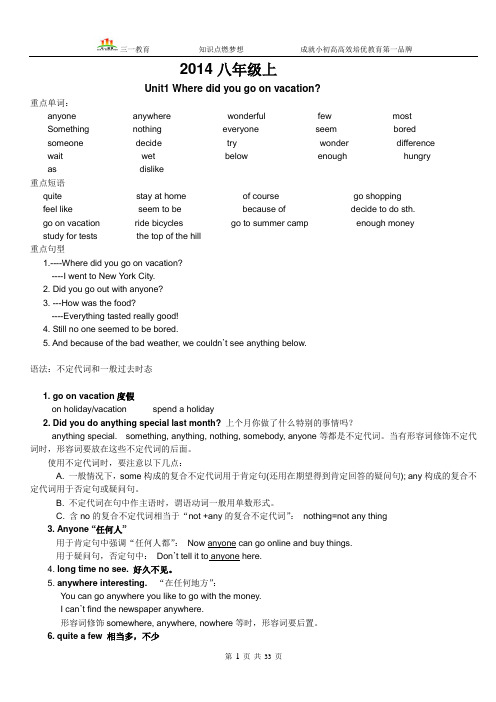
2014八年级上Unit1 Where did you go on vacation?重点单词:anyone anywhere wonderful few mostSomething nothing everyone seem boredsomeone decide try wonder differencewait wet below enough hungryas dislike重点短语quite stay at home of course go shoppingfeel like seem to be because of decide to do sth.go on vacation ride bicycles go to summer camp enough moneystudy for tests the top of the hill重点句型1.----Where did you go on vacation?----I went to New York City.2. Did you go out with anyone?3. ---How was the food?----Everything tasted really good!4. Still no one seemed to be bored.5. And because of the bad weather, we couldn’t see anything below.语法:不定代词和一般过去时态1. go on vacation度假on holiday/vacation spend a holiday2. Did you do anything special last month? 上个月你做了什么特别的事情吗?anything special. something, anything, nothing, somebody, anyone等都是不定代词。
新版英语人教版八年级上册重点难点知识点讲解归纳总结
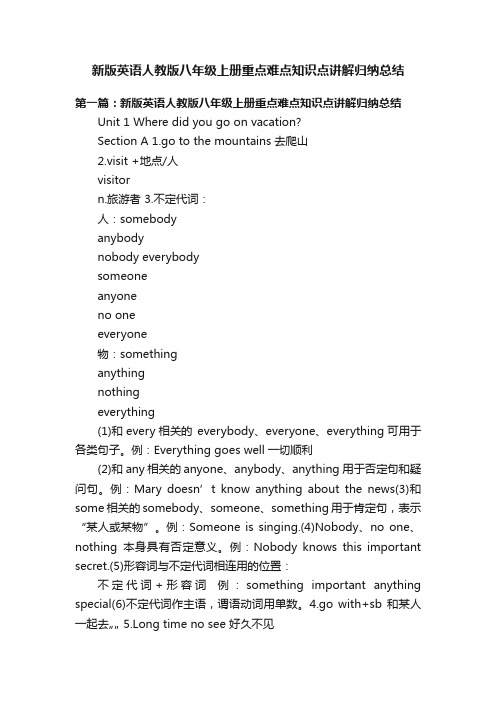
新版英语人教版八年级上册重点难点知识点讲解归纳总结第一篇:新版英语人教版八年级上册重点难点知识点讲解归纳总结Unit 1 Where did you go on vacation?Section A 1.go to the mountains去爬山2.visit +地点/人visitorn.旅游者 3.不定代词:人:somebodyanybodynobody everybodysomeoneanyoneno oneeveryone物:somethinganythingnothingeverything(1)和every相关的everybody、everyone、everything可用于各类句子。
例:Everything goes well一切顺利(2)和any 相关的 anyone、anybody、anything用于否定句和疑问句。
例:Mary doesn’t know anything about the news(3)和some相关的somebody、someone、something用于肯定句,表示“某人或某物”。
例:Someone is singing.(4)Nobody、no one、nothing本身具有否定意义。
例:Nobody knows this important secret.(5)形容词与不定代词相连用的位置:不定代词+形容词例:something important anything special(6)不定代词作主语,谓语动词用单数。
4.go with+sb 和某人一起去…… 5.Long t ime no see 好久不见6.quite a few相当多=lots of=a lot of=plenty of 接可数名词a few有一些、few很少(几乎没有、否定概念)接不可数名词a little有一些、little很少(几乎没有、否定概念)7.take photos拍照take photos with 和……合影take photos of 给……拍照8.what about+名词/代词/动名词9.Most of the time大多数时间谓语动词的单复数取决于Most of 后面所修饰的名词例:Most of the students go to the beach.例:Most of the water turns green.10.taste/look/feel/sound/smell+形容词11.一切顺利:Everything was excellent./ Everything goes well12.你认为……怎么样?How do you like…?=what do you think of …?= how do you feel about…? 13.buy sb sth=buy sth for sb 14.Seem 看起来……(1)seem+形容词例:Tom seems tired.(2)Seem like “好像” 例:It seems like a good idea.(3)Seem to do“似乎” 例:I seem to have a cold.(4)It seems/seemed +从句“似乎” 例:It seems that I can pass the exam.15.nothing much to do没什么事可做nothing…b ut出了……之外,什么也没有16.Bye for now 到这该说再见了17.feed----fed 喂养 18.Keep a diary 记日记Section B 1.到达(1)arrive in+大地点arrive at+小地点(2)get to +地点(3)reach+地点 2.decide to do 决定做……3.try doing sth 动作已发生,不一定付出太多努力try to do sth动作未发生,付出努力 4.(1)feel like+从句“感受到……”例:He feels like he is swimming.(2)feel like “想要……”+名词/代词/动名词例:Do you feel like taking a walk with me?5.wonder “想知道,琢磨”后接who,what,why等疑问词引导的宾语从句。
新人教版八年级上册英语Unit1课文重难点讲解
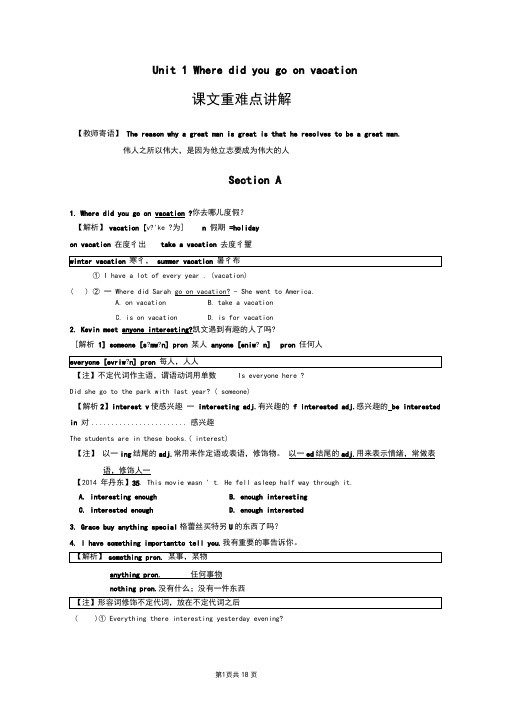
Unit 1 Where did you go on vacation课文重难点讲解【教师寄语】 The reason why a great man is great is that he resolves to be a great man.伟人之所以伟大,是因为他立志要成为伟大的人Section A1. Where did you go on vacation ?你去哪儿度假?【解析】 vacation [v?'ke ?为]n 假期 =holiday on vacation 在度彳出 take a vacation 去度彳矍① I have a lot of every year . (vacation)() ② 一 Where did Sarah go on vacation? - She went to America.2. Kevin meet anyone interesting?凯文遇到有趣的人了吗?[解析 1] someone [s ?mw ?n] pron 某人 anyone [eniw ? n] pron 任何人【注】不定代词作主语,谓语动词用单数 Is everyone here ? Did she go to the park with last year? ( someone)【解析2】interest v 使感兴趣 一 interesting adj.有兴趣的 f interested adj.感兴趣的 be interested in 对 ........................ 感兴趣The students are in these books.( interest)【注】 以一ing 结尾的adj.常用来作定语或表语,修饰物。
以一ed 结尾的adj.用来表示情绪,常做表语,修饰人一【2014 年丹东】35. This movie wasn ' t. He fell asleep half way through it.A. interesting enoughB. enough interestingC. interested enoughD. enough interested3. Grace buy anything special 格蕾丝买特另U 的东西了吗?4. I have something importantto tell you.我有重要的事告诉你。
人教新目标八年级英语上册重难点知识点归纳
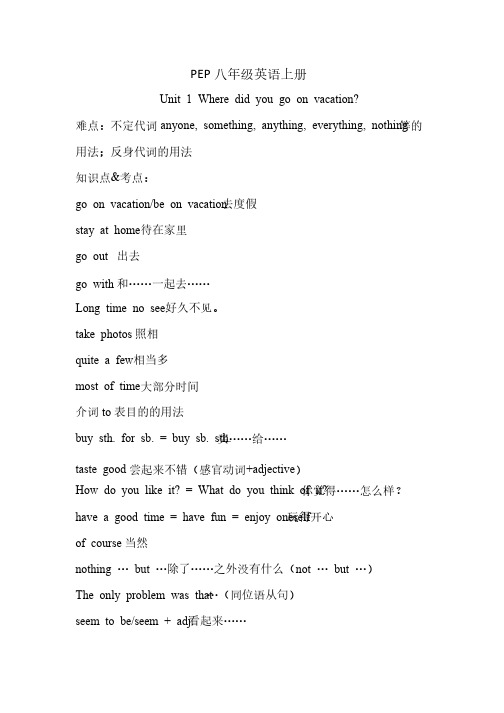
PEP八年级英语上册八年级英语上册Unit 1 Where did you go on vacation? 难点:不定代词anyone, something, anything, everything, nothing等的用法;反身代词的用法用法;反身代词的用法知识点&考点:考点:go on vacation/be on vacation 去度假去度假stay at home 待在家里待在家里待在家里go out 出去出去go with 和……一起去……和……一起去……Long time no see. 好久不见。
好久不见。
take photos 照相照相quite a few 相当多相当多相当多most of time 大部分时间大部分时间大部分时间表目的的用法介词to表目的的用法buy sth. for sb. = buy sb. sth. 买……给……买……给……taste good 尝起来不错(感官动词+adjective)How do you like it? = What do you think of it? 你觉得……怎么样?你觉得……怎么样?have a good time = have fun = enjoy oneself玩得开心玩得开心of course 当然当然nothing …but …除了……之外没有什么(not …but …)…)The only problem was that …(同位语从句)…(同位语从句)seem to be/seem + adj. 看起来……看起来……keep a diary 记日记记日记记日记 + at + 小地点小地点小地点arrive + in + 大地点大地点大地点 decide to do 决定做某事决定做某事决定做某事 try doing sth. 尝试做某事尝试做某事尝试做某事 try to do sth. 尽力做某事尽力做某事feel like 感觉到感觉到 feel like + n./ v-ing 想要……想要……ride … to …骑……到………骑……到……许多的:a lot of + 可数名词可数名词 lots of + 可数可数or 不可数名词不可数名词 I wonder that …我想知道………我想知道………我想知道…… in the past 在过去在过去在过去 enjoy doing sth. 享受做某事享受做某事享受做某事 walk around 到处逛逛到处逛逛感叹句:What + 冠词冠词 + adj. + n. + (it is) = How + adj. + 冠词冠词 + n. + (it is) start start doing doing doing sth. sth. 开始做某事开始做某事 stop stop doing doing doing sth. sth. 停止做某事停止做某事 finish finish doing doing sth. 结束做某事结束做某事because & so (不可同用)(不可同用)(不可同用) wait for …等待………等待……because of + n. a little/ a few 一些(两者的区别,以及与little/few 的区别)的区别) enough + n. / adj. + enough as + adj./adv. + as 和……一样……和……一样……one bowl of …一碗………一碗……along the way 沿着这条路沿着这条路沿着这条路 时间段+ later = after + 时间段……之后时间段……之后other, others, the other, the others, another on trip 在旅途中在旅途中find out 找到,找出找到,找出 / find 寻找寻找 / look for 寻找寻找寻找 so + adj. + that + 从句如此……以致……从句如此……以致……tell sb. (not) to do sth. 告诉某人(不要)做某事告诉某人(不要)做某事keep doing sth. / go on doing sth. 继续做某事继续做某事keep sth. + adj. 使……保持……状态使……保持……状态up and down (人)来来往往;(人)来来往往;(物)上上下下(物)上上下下in excitement = excitedly 兴奋地兴奋地come up / come out / come on / come in forget to do sth. 忘记做某事忘记做某事 forget doing sth. 忘记做过某事忘记做过某事忘记做过某事 like / dislike + n. / v-ing 喜欢/不喜欢某物/做某事做某事something + adj. ……的事情……的事情……的事情 Why not + v. = Why don ’t you + v. 为什么不……呢?为什么不……呢?Unit 2 How often do you exercise? 重点:1. How often 句型的运用;2. 2. 六个频度副词六个频度副词never, hardly ever, sometimes, sometimes, often, often, often, usually, usually, usually, always always 的差异、理解及使用;3. 频率数词once, twice 等的认识和运用;4. 一般现在时不同人称谓语形式的变化及一般疑问句的问答。
人教版新目标八年级英语上册Unit 2讲义及重点总结
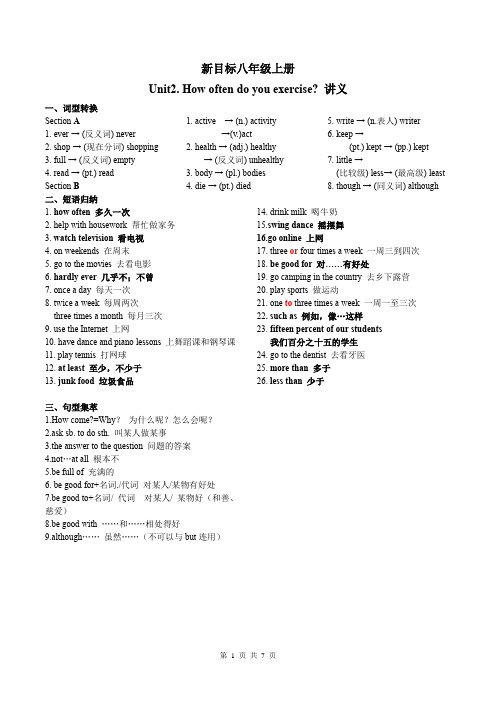
新目标八年级上册Unit2. How often do you exercise? 讲义一、词型转换Section A1. ever → (反义词) never2. shop → (现在分词) shopping3. full → (反义词) empty4. read → (pt.) readSection B 1. active → (n.) activity→(v.)act2. health → (adj.) healthy→ (反义词) unhealthy3. body → (pl.) bodies4. die → (pt.) died5. write → (n.表人) writer6. keep →(pt.) kept → (pp.) kept7. little →(比较级) less→ (最高级) least8. though → (同义词) although二、短语归纳1. how often 多久一次2. help with housework 帮忙做家务3. watch television 看电视4. on weekends 在周末5. go to the movies 去看电影6. hardly ever 几乎不;不曾7. once a day 每天一次8. twice a week 每周两次three times a month 每月三次9. use the Internet 上网10. have dance and piano lessons 上舞蹈课和钢琴课11. play tennis 打网球12. at least 至少,不少于13. junk food 垃圾食品14. drink milk 喝牛奶15.swing dance 摇摆舞16.go online 上网17. three or four times a week 一周三到四次18. be good for 对……有好处19. go camping in the country 去乡下露营20. play sports 做运动21. one to three times a week 一周一至三次22. such as 例如,像…这样23. fifteen percent of our students我们百分之十五的学生24. go to the dentist 去看牙医25. more than 多于26. less than 少于三、句型集萃1.How come?=Why?为什么呢?怎么会呢?2.ask sb. to do sth. 叫某人做某事3.the answer to the question 问题的答案4.not…at all 根本不5.be full of 充满的6. be good for+名词./代词对某人/某物有好处7.be good to+名词/ 代词对某人/ 某物好(和善、慈爱)8.be good with ……和……相处得好9.although……虽然……(不可以与but连用)四、难点讲练1.How often do you exercise?你多久锻炼一次?(1)how often表示“多久一次”。
人教版新目标八年级英语上册单元知识详解全册

Detailed Solution for Unit 2 What’s the matter.【重要词组】◆ have a cold 患感冒◆ stressed out 紧张的,有压力的◆ bean sprout 豆芽◆ get tired 感觉疲惫◆ stay healthy 保持健康◆ at the moment 此刻,现在◆ get/ have a cold 患感冒◆ see a doctor /dentist 看医生/牙医◆ go to the party 去参加聚会◆ make sb sick 使某人不舒服(患锁病)◆ have a sore throat 嗓子痛◆ have a fever 发烧,发热◆ have a toothache 牙痛◆ have a backache 背痛◆lie down and rest 躺下休息◆drink lots of water 喝大量水◆drink hot tea with honey 喝热蜂蜜茶◆ have a headache 头痛◆ get tired 累了医院名称:children’s hospital 儿童医院clinic 诊疗所first - aid station 急救站ward 病房medical department 内科surgical department 外科registration office 挂号处out - patient department(OPD) 门诊部in - patient department 住院部nursing department 护理部waiting room 候诊室emergency room 急诊室operation room 手术室laboratory 化验室blood bank 血库pharmacy , dispensary 药房表示感觉的形容词有:tired 累的thirsty口渴的hungry饿的stressed out紧张的,有压力的【重要词句详解】1. How to talk about our health①问某人哪儿不舒服:When we are not feeling well , we often go to see the doctor . The doctor will ask :What’s wrong (with you) ?What’s the matter (with you) ? What’s your trouble ? What happens to you ?Is there anything wrong with you ?都表示“你怎么了?”。
新目标八年级英语上册全册教案
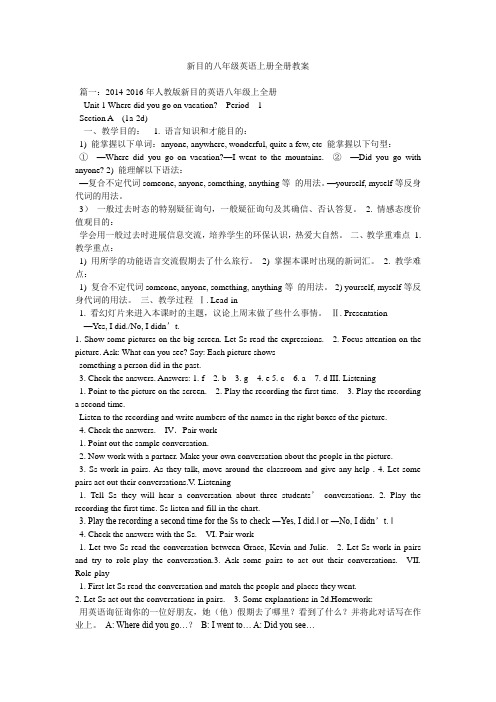
新目的八年级英语上册全册教案篇一:2014-2016年人教版新目的英语八年级上全册Unit 1 Where did you go on vacation? Period 1Section A (1a-2d)一、教学目的: 1. 语言知识和才能目的:1) 能掌握以下单词:anyone, anywhere, wonderful, quite a few, etc 能掌握以下句型:①—Where did you go on vacation?—I went to the mountains. ②—Did you go with anyone? 2) 能理解以下语法:—复合不定代词someone, anyone, something, anything等的用法。
—yourself, myself等反身代词的用法。
3)一般过去时态的特别疑征询句,一般疑征询句及其确信、否认答复。
2. 情感态度价值观目的:学会用一般过去时进展信息交流,培养学生的环保认识,热爱大自然。
二、教学重难点1. 教学重点:1) 用所学的功能语言交流假期去了什么旅行。
2) 掌握本课时出现的新词汇。
2. 教学难点:1) 复合不定代词someone, anyone, something, anything等的用法。
2) yourself, myself等反身代词的用法。
三、教学过程Ⅰ. Lead-in1. 看幻灯片来进入本课时的主题,议论上周末做了些什么事情。
Ⅱ. Presentation —Yes, I did./No, I didn’t.1. Show some pictures on the big screen. Let Ss read the expressions.2. Focus attention on the picture. Ask: What can you see? Say: Each picture showssomething a person did in the past.3. Check the answers. Answers: 1. f 2. b 3. g4. e5. c6. a7. d III. Listening1. Point to the picture on the screen.2. Play the recording the first time.3. Play the recordinga second time.Listen to the recording and write numbers of the names in the right boxes of the picture.4. Check the answers. IV.Pair work1. Point out the sample conversation.2. Now work with a partner. Make your own conversation about the people in the picture.3. Ss work in pairs. As they talk, move around the classroom and give any help .4. Let some pairs act out their conversations.V. Listening1. Tell Ss they will hear a conversation about three students’conversations.2. Play the recording the first time. Ss listen and fill in the chart.3. Play the recording a second time for the Ss to check ―Yes, I did.‖ or ―No, I didn’t. ‖4. Check the answers with the Ss. VI. Pair work1. Let two Ss read the conversation between Grace, Kevin and Julie.2. Let Ss work in pairs and try to role-play the conversation.3. Ask some pairs to act out their conversations. VII. Role-play1. First let Ss read the conversation and match the people and places they went.2. Let Ss act out the conversations in pairs.3. Some explanations in 2d.Homework:用英语询征询你的一位好朋友,她(他)假期去了哪里?看到了什么?并将此对话写在作业上。
新目标初二上第10单元重难点讲解

新目标初二上第10单元重难点讲解(一)用“be going to” 结构表示将来要发生的事,或打算、计划,决定要做的事情。
新目标初二上第10单元重难点讲解1. 这个结构的使用主要侧重于口语。
表示事先计划好的客观的或肯定要发生的事情。
状语经常是表示将来的词。
如:tomorrow , the day after tomorrow , soon (不久), this afternoon , this evening , this year , before long (不久) , in the future (将来), in the near future (在不久的将来),some day (某天)2. 陈述句基本构成:主语 + be (am , is , are) + going to + 动词原形如:I am going to travel around the world .我将到世界各地旅游。
They are going to meet outside the school gate .他们将在校门口见面。
He is going to play basketball tomorrow .他打算明天打蓝球。
It is going to rain .天将下雨。
上边四句中am , is , are为助动词,根据主语不同而改变。
“going to”每个句中都有。
注意to 后边的动词:travel , meet , play , rain 都是原形。
3. 否定句:主 + be + not + going to + 动词原形如:We are not going to have any classes next week .下周我们将不上课。
I am not going to be a teacher .我将不成为教师。
4. 疑问句:将Am , Is , Are 提前大写即可。
B (Am , Is , Are ) + 主语 + going to + 动词原形如:Are you going to be a doctor when you grow up ?你长大后将做一名医生吗?简略回答:Yes , I am . No , I am not .Is he going to take the piano lesson tomorrow ?他明天上音乐课吗?Yes , he is . No , he isn’t .5. 特殊疑问句:特殊疑问词 When (How , What , Where )等 + be (am , is , are ) + 主 + going to + 动词原形如:你下周日将干什么?What are you going to do next Sunday ?你下星期天将做什么?6. 此外表示将来的一般将来时和“be going to ”表将来的区别是什么呢。
人教版新目标八年级上册英语知识点全册

...Monday, July 15thI arrived in Penang in Malaysia this morning with my family. It was sunny and hot, so we decided to go to the beach near our hotel. My sister and I tried paragliding. I felt like I was a bird. It was so exciting! For lunch, we had something very special—Malaysian yellow noodles. They were delicious! In the afternoon, we rode bicycles to Georgetown. There are a lot of new buildings now, but many of the old buildings are still there. In Weld Quay, a really old place in Georgetown, we saw the housesof the Chinese traders from 100 years ago. I wonder what life was like here in the past. I really enjoyed walking around the town.Tuesday, July 16thWhat a different a day makes! My father and I decided to go to Penang Hill today. We wanted to walk up to the top, but then it started raining a little so we decided to take the train. We waited over and hour for the train because there were too many people. When we got to the top, it was raining really hard. We didn ’ t have an umbrella so we were wet and cold. It was terrible. And because of the bad weather, wecouldn ’ t see anything below. My father didn ’ t bring enough money, so we only had one bowl of r some fish. The food tasted great because I was so hungry!不规那么动词过去式:am,is-was are-were,do-did,see-saw,say-saidgive-gave get-got,go-went come-came have-had,eat-ate take-took run-ran,sing-sang,put-put,make-made read-read,write-wrote draw-drewdrink-drank,fly-flew,ride-rode,speak-spoke,sweep-swept buy-bought,swim-swam,sit-sat,bring--brought,can-could,cut-cut become-became,begin-began,draw-drew feel-felt find-foundforget-forgot hear-heard keep-kept know-knew,learn-learnt〔 learned〕leave-left,let-let,lose-lost,meet-met,read-read,sleep-slept,speak-spoke,take-took teach-taught ,tell-told,wake-wokeUnit2 How often do you exercise?单词housework ['ha?sw??k] n.家务劳动hardly ['hɑ?dli] adv.几乎不;简直不;刚刚ever ['ev?(r)] adv.曾经;在任何时候once [w?ns] adv一.次;曾经twice [twa?s] adv两.倍;两次Internet ['?nt?net] n.因特网program ['pr??ɡ r?m] n节.目;程序;课程;节目单 full [f?l] adj. 满的;充满的;完全的 swing [sw??] n摇.摆;秋千 v.摇摆;旋转maybe ['me?bi] adv.或许;也许;可能swing dance摇摆舞least [li?st] adj.最小的;最少的at least至少hardly ever 很少;几乎从不;难得junk n.垃圾;废旧杂物coffee ['k?fi] n.咖啡;咖啡色health [helθ健]康n.;人的身体或精神状态result [r?'z?lt] .结果;后果percent [p?'sent] adj.百分之 ...的online [??n'la?n] adj.在线的 adv.在线地television ['tel?v??n] n.电视机;电视节目although [??l'e??] conj.虽然;尽管;然而;可是through [ θ ru?] prep.穿过;凭借;一直到body ['b?di] n.身体mind [ma?nd] .头脑;想法;意见;心思such [s?t?] adj.这样的;如此的together [t?'ɡ ee?(r)] adv共.同;一起die [da?] v.死;枯竭;消失writer ['ra ?t?(r)] n. 作者;作家dentist ['dent?st] n.牙科医生magazine ['m?ɡ ?zi?n] n.杂志however [ha?'ev?(r)] adv.然而;无论如何;不管多么 than [e?n] conj.比almost ['??lm??st] adv.几乎;差不多none [n?n] pron.没有人;没有任何东西,毫无less [les] adj更.少的;较少的point [p??nt] n.看法;要点;重点;小数点;目标;分数重点短语such as例如;诸如junk food n.垃圾食品;无营养食品more than 超过;多于;不仅仅;非常less than不到;少于help with housework 帮助做家务on weekends 在周末how often 多久一次hardly ever几乎从不once a week 每周一次twice a month 每月两次every day 每天be free 有空go to the movies 去看电影use the Internet用互联网swing dance摇摆舞play tennis打网球stay up late熬夜;睡得很晚at least 至少have dance and piano lessons上舞蹈课和钢琴课go to bed early 早点睡觉play sports 进展体育活动be good for对⋯⋯有好处go camping 去野营not ⋯ at all 一点儿也不⋯⋯in one ’ s free time在某人的业余时间the most popular 最受欢送的such as 比方;诸如old habits die hard积习难改go to the dentist 去看牙医morn than多于;超过less than 少于help sb. with sth.帮助某人做某事How about⋯ ? ......怎么样?want sb. to do sth.想让某人做某事How many+可数名词复数 +一般疑问句?⋯⋯有多少⋯⋯ ?spend time with sb.和某人一起度过时光It ’ s+ adj.+ to do sth做.某事的⋯⋯的。
新目标八年级上册Unit 1课本重点讲解与归纳
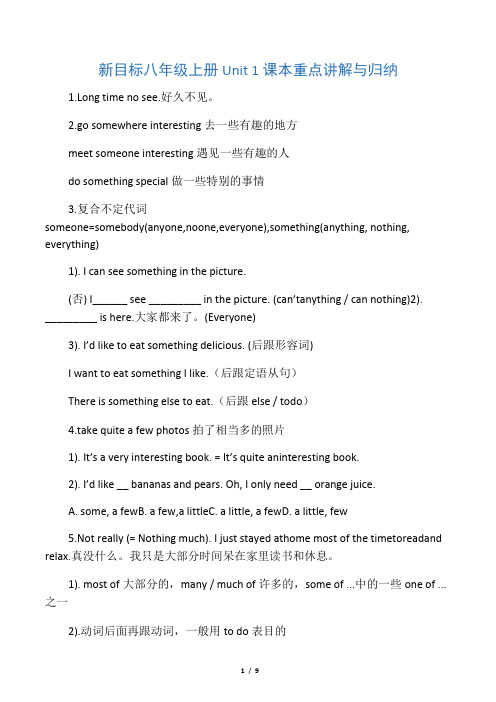
新目标八年级上册Unit 1课本重点讲解与归纳1.Long time no see.好久不见。
2.go somewhere interesting去一些有趣的地方meet someone interesting遇见一些有趣的人do something special做一些特别的事情3.复合不定代词someone=somebody(anyone,noone,everyone),something(anything, nothing, everything)1). I can see something in the picture.(否) I______ see _________ in the picture. (can’tanything / can nothing)2)._________ is here.大家都来了。
(Everyone)3). I’d like to e at something delicious. (后跟形容词)I want to eat something I like.(后跟定语从句)There is something else to eat.(后跟else / todo)4.take quite a few photos拍了相当多的照片1). It’s a very interesting book. = It’s quite aninteresting book.2). I’d like __ bananas and pears. O h, I only need __ orange juice.A. some, a fewB. a few,a littleC. a little, a fewD. a little, few5.Not really (= Nothing much). I just stayed athome most of the timetoreadand relax.真没什么。
人教版新目标八年级英语上册Unit 7讲义及重点总结

新目标八年级上册Unit 7 Will people have robots? 讲义一、词性转换1.paper n. 纸张(不可数)2.pollution n. 污染物pollute v. 污染3.prediction n. 预言;预测predict v. 预测4.astronaut n. 宇航员5.dangerous a. 有危险的danger n. 危险6.disagree v. 不同意7.possible a. 可能的impossible a. 不可能的8.probably adv. 很可能二、短语归纳1.play a part 参加(某事)2.space station 太空站3.over and over again 多次;反复地4.hundred of 许多;大量5.fall down 突然倒下;跌倒6.look for 寻找;寻求7.in great danger 在巨大的危险中8.help with 帮助9.for example 举例10.in the future 在未来11.look like 看起来像12.wake up 醒来13.fewer people更少的人14.14. less free time更少的空闲时间15.15. in ten years 10年后(提问用How soon)16.fall in love with…爱上…17.hundreds of +名词复数数百/几百(概数,类似还有thousands of; millions of)18.the same as 和……相同19.A be different from B A与B不同20.wake up醒来21.get bored变得厌倦(get/become+形容词)22.keep a bird 养一只鸟23.lots of /a lot of许多+可数或不可数名词24.disagree with sb.不同意某人(的意见)disagree on sth. 不同意某事25.I don’t agree. = I disagree.我不同意26.on vacation度假27.help sb with sth 帮助某人做某事28.live in an apartment住在公寓里live on the earth 住在地球上29.besides与except =but(除…之外,不包括)30.be able to与can 能、会31.live on a space station 住在空间站32.over and over again 一次又一次33.10 years from now 今后10年34.be difficult to do 做……有困难35.the same …as 和……一样三、重难点深度解析1. Do you think there will be robots in people's homes? 你认为将来人们的家里会有机器人吗?Do you think...? 结构通常用来征求对方的意见或看法,后面接宾语从句,从句用陈述语序。
新目标英语八年级上册教材全梳理(Unit1-12)
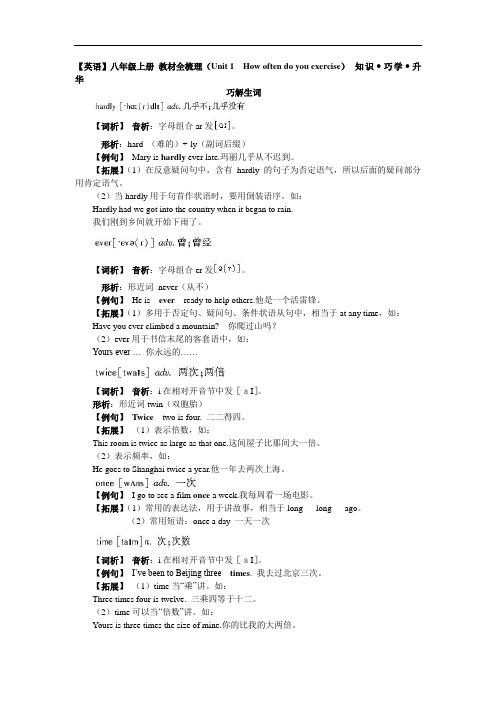
【英语】八年级上册教材全梳理(Unit 1How often do you exercise)知识•巧学•升华巧解生词【词析】音析:字母组合ar发。
形析:hard (难的)+-ly(副词后缀)【例句】Mary is hardly ever late.玛丽几乎从不迟到。
【拓展】(1)在反意疑问句中,含有hardly的句子为否定语气,所以后面的疑问部分用肯定语气。
(2)当hardly用于句首作状语时,要用倒装语序。
如:Hardly had we got into the country when it began to rain.我们刚到乡间就开始下雨了。
【词析】音析:字母组合er发。
形析:形近词never(从不)【例句】He is ever ready to help others.他是一个活雷锋。
【拓展】(1)多用于否定句、疑问句、条件状语从句中,相当于at any time,如:Have you ever climbed a mountain?你爬过山吗?(2)ever用于书信末尾的客套语中,如:Yours ever … 你永远的……【词析】音析:i在相对开音节中发[aI]。
形析:形近词twin(双胞胎)【例句】Twice two is four. 二二得四。
【拓展】(1)表示倍数,如:This room is twice as large as that one.这间屋子比那间大一倍。
(2)表示频率,如:He goes to Shanghai twice a year.他一年去两次上海。
【例句】I go to see a film once a week.我每周看一场电影。
【拓展】(1)常用的表达法,用于讲故事,相当于long long ago。
(2)常用短语:once a day 一天一次【词析】音析:i在相对开音节中发[aI]。
【例句】I’ve been to Beijing three times. 我去过北京三次。
人教新目标英语八年级上册unit1-Unit4单元重点知识复习
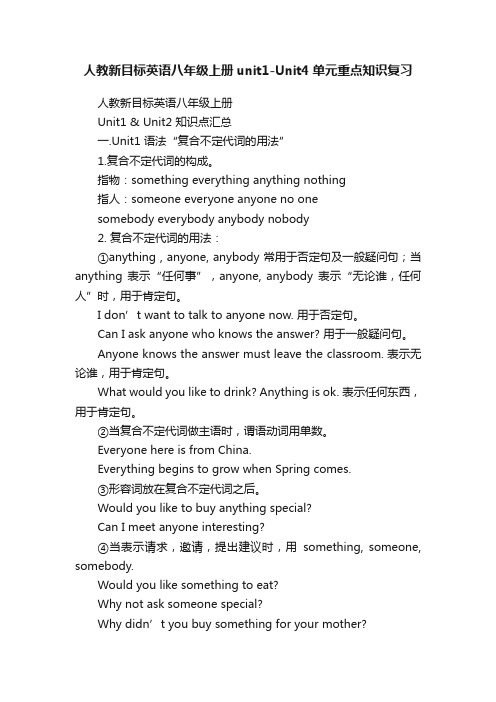
人教新目标英语八年级上册unit1-Unit4单元重点知识复习人教新目标英语八年级上册Unit1 & Unit2 知识点汇总一.Unit1 语法“复合不定代词的用法”1.复合不定代词的构成。
指物:something everything anything nothing指人:someone everyone anyone no onesomebody everybody anybody nobody2. 复合不定代词的用法:①anything , anyone, anybody 常用于否定句及一般疑问句;当anything 表示“任何事”,anyone, anybody 表示“无论谁,任何人”时,用于肯定句。
I don’t want to talk to anyone now. 用于否定句。
Can I ask anyone who knows the answer? 用于一般疑问句。
Anyone knows the answer must leave the classroom. 表示无论谁,用于肯定句。
What would you like to drink? Anything is ok. 表示任何东西,用于肯定句。
②当复合不定代词做主语时,谓语动词用单数。
Everyone here is from China.Everything begins to grow when Spring comes.③形容词放在复合不定代词之后。
Would you like to buy anything special?Can I meet anyone interesting?④当表示请求,邀请,提出建议时,用something, someone, somebody.Would you like something to eat?Why not ask someone special?Why didn’t you buy something for your mother?Unit2 语法“频率副词”How often 常用于对频率的提问,意为“多长时间一次”,其答语可以是once/ twice / three times a week; always/ usually/ often/ sometimes/ hardly ever/ never 等表示时间频率的副词及短语。
人教版新目标英语八年级上册知识要点
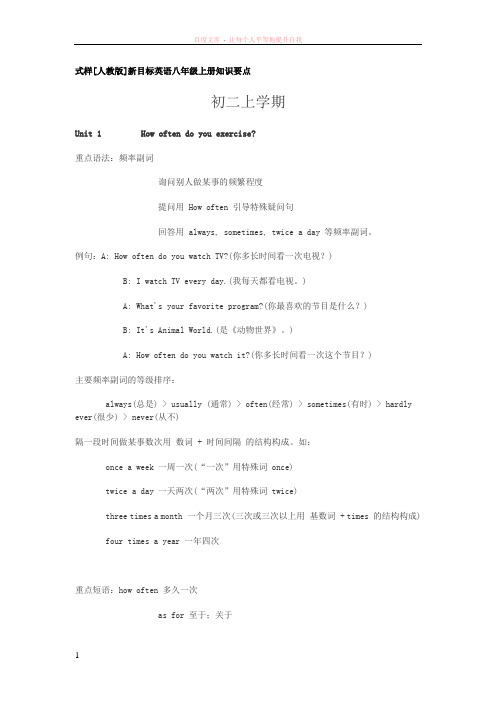
式样[人教版]新目标英语八年级上册知识要点初二上学期Unit 1 How often do you exercise?重点语法:频率副词询问别人做某事的频繁程度提问用 How often 引导特殊疑问句回答用 always, sometimes, twice a day 等频率副词。
例句:A: How often do you watch TV?(你多长时间看一次电视?)B: I watch TV every day.(我每天都看电视。
)A: What's your favorite program?(你最喜欢的节目是什么?)B: It's Animal World.(是《动物世界》。
)A: How often do you watch it?(你多长时间看一次这个节目?)主要频率副词的等级排序:always(总是) > usually (通常) > often(经常) > sometimes(有时) > hardly ever(很少) > never(从不)隔一段时间做某事数次用数词 + 时间间隔的结构构成。
如:once a week 一周一次(“一次”用特殊词 once)twice a day 一天两次(“两次”用特殊词 twice)three times a month 一个月三次(三次或三次以上用基数词 + times 的结构构成)four times a year 一年四次重点短语:how often 多久一次as for 至于;关于how many 多少(针对可数名词)how much 多少(针对不可数名词)of course = sure 当然;确信look after = take care of = care for 照顾;照看a lot of = lots of = plenty of 许多;大量every day 每一天every night 每晚hardly ever 几乎不be good for 对……有益be good for one's health 有益健康try to do sth. 尝试做某事get good grades 取得好成绩help sb. [to] do sth. 帮助某人做某事kind of 有点want [sb.] to do sth. 想要(某人)做某事keep in good health 保持健康No two men think alike. 人心各异。
2017年秋八年级上册新目标英语全册课文重难点讲解(全)
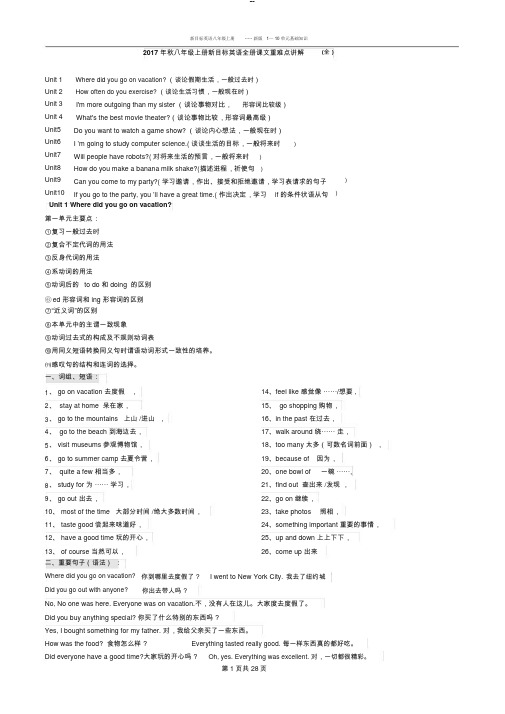
新目标英语八年级上册----- 新版1— 10 单元基础知识2017 年秋八年级上册新目标英语全册课文重难点讲解(全 )Unit 1Where did you go on vacation? (谈论假期生活,一般过去时)Unit 2How often do you exercise? (谈论生活习惯,一般现在时)Unit 3 Unit 4 Unit5 Unit6 Unit7 Unit8 Unit9 Unit10I'm more outgoing than my sister (谈论事物对比,形容词比较级)What's the best movie theater?(谈论事物比较,形容词最高级)Do you want to watch a game show? (谈论内心想法,一般现在时)I ’m going to study computer science.( 谈谈生活的目标,一般将来时)Will people have robots?( 对将来生活的预言,一般将来时)How do you make a banana milk shake?(描述进程,祈使句)Can you come to my party?( 学习邀请,作出、接受和拒绝邀请,学习表请求的句子If you go to the party, you ’ll have a great time.( 作出决定,学习if 的条件状语从句))Unit 1 Where did you go on vacation?第一单元主要点:①复习一般过去时②复合不定代词的用法③反身代词的用法④系动词的用法⑤动词后的to do 和 doing 的区别⑥ed 形容词和 ing 形容词的区别⑦“近义词”的区别⑧本单元中的主谓一致现象⑨动词过去式的构成及不规则动词表⑩用同义短语转换同义句时谓语动词形式一致性的培养。
⑾感叹句的结构和连词的选择。
八年级英语新目标上课本重难点整理
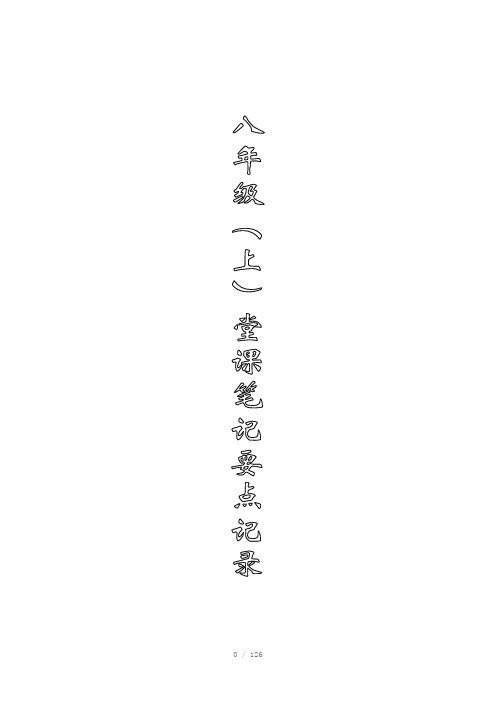
Unit 1 How often do you exercise?I. 重点短语1. go to the movies=go to a movie 看电影2. look after = take care of 照顾3. surf the Internet 上网4. healthy lifestyle 健康的生活方式5. go skateboarding去滑滑板;去划板6. (be) in good health =(be)healthy 身体健康7. keep healthy = keep in good health 保持健康8. as for 至于9. take/do exercise=play/ do sports 锻炼,做运动10. eating habits 饮食习惯11. the same as 与……相同12. once a month 一月一次13. be different from 与……不同14. twice a week 一周两次15. make a difference to 对什么有影响16. how often 多久一次17. although=though 虽然18. most of the students=most students 大多数学生19. activity survey 活动调查20. go shopping=do some shopping 购物21. do homework 做家庭作业22. high school 中学23. junk food 垃圾食物24. be good/bad for 对……有益(害)25. on/at weekends 在周末26. want to do sth=would like to do sth =feel like doing sth 想要做某事27. want sb to do sth = would like sb to do sth 想要某人做某事28. try to do sth 尽量做某事try doing sth. 试着做某try one’s best to do sth. 尽力做某事29. come home from school 放学回家30. of course = certainly = sure 当然31. get good grades 取得好成绩32. help sb (to)do sth 帮助某人做某事,33. help sb with sth 在某方面帮助某人34. a lot of = lots of = many /much 许多,大量的35.as for 至于;关于36.how many 多少(针对可数名词)37.how much 多少(针对不可数名词)38. hardly ever 几乎不39. be good for one's health 有益健康40. try to do sth. 尝试做某事II. 重点句型1 How often do you exercise? 你多久锻炼一次?2 Three to six times a week 每周三到六次3 How long do you sleep every night? 你每天睡几个小时?4.I sleep more than 5 hours every night 多于5小时5. How often do you eat fruit and vegetables? 你多久吃一次水果和蔬菜?6.What do you usually do on weekends?你周末通常做什么?7.I usually play soccer 我通常踢足球8.What is your favorite program?你最喜欢的节目是什么?9.Some students are very active,they exercise every day一些学生非常的活泼,每天都运动.10.As for homework,most students do it every day关于作业,大多数学生每天都做.III. 课文解析1.How often do you exercise? (P.1)How often提出的问题表示询问动作发生的频率,意为“多长时间一次,多久一次”,可用once a day, sometimes, always, often, never 等词语回答。
新目标英语八年级上册课文要点归纳
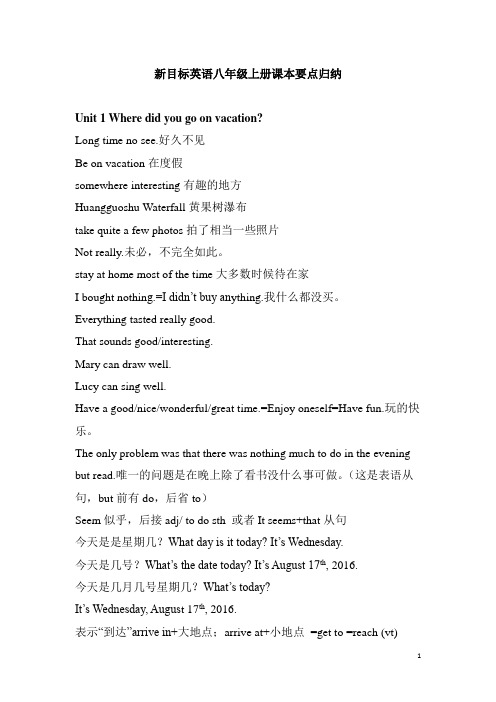
新目标英语八年级上册课本要点归纳Unit 1 Where did you go on vacation?Long time no see.好久不见Be on vacation在度假somewhere interesting有趣的地方Huangguoshu Waterfall黄果树瀑布take quite a few photos拍了相当一些照片Not really.未必,不完全如此。
stay at home most of the time大多数时候待在家I bought nothin g.=I didn’t buy an ything.我什么都没买。
Everything tasted really good.That sounds good/interesting.Mary can draw well.Lucy can sing well.Have a good/nice/wonderful/great time.=Enjoy oneself=Have fun.玩的快乐。
The only problem was that there was nothing much to do in the evening but read.唯一的问题是在晚上除了看书没什么事可做。
(这是表语从句,but前有do,后省to)Seem似乎,后接adj/ to do sth 或者It seems+that从句今天是是星期几?What day is it today? It’s Wednesday.今天是几号?What’s the date today? It’s August 17th, 2016.今天是几月几号星期几?What’s today?It’s Wednesday, Augus t 17th, 2016.表示“到达”arrive in+大地点;arrive at+小地点=get to =reach (vt)It was sunny and hot.How was the weather?= What was the weather like?决定做某事:decide to do=make a decision to dotry to do /not to do努力(不)做某事try doing/not doing 尝试(不)做某事try/ do one’s best to do尽力做某事like+to do/doing喜欢做某事would like to do想要做某事feel like doing想要做某事午饭我吃了鱼和土豆。
- 1、下载文档前请自行甄别文档内容的完整性,平台不提供额外的编辑、内容补充、找答案等附加服务。
- 2、"仅部分预览"的文档,不可在线预览部分如存在完整性等问题,可反馈申请退款(可完整预览的文档不适用该条件!)。
- 3、如文档侵犯您的权益,请联系客服反馈,我们会尽快为您处理(人工客服工作时间:9:00-18:30)。
Unit 1 Where did you go on vacation?(谈论假期生活,一般过去时)Unit 2 How often do you exercise?(谈论生活习惯,一般现在时)Unit 3 I'm more outgoing than my sister(谈论事物对比,形容词比较级)Unit 4 What's the best movie theater?(谈论事物比较,形容词最高级)Unit5 Do you want to watch a game show?(谈论内心想法,一般现在时)Unit6 I’m going to study computer science.(谈谈生活的目标,一般将来时)Unit7 Will people have robots?(对将来生活的预言,一般将来时)Unit8 How do you make a banana milk shake?(描述进程,祈使句)Unit9 Can you come to my party?(学习邀请,作出、接受和拒绝邀请,学习表请求的句子) Unit10 If you go to the party, you’ll have a great time.(作出决定,学习if的条件状语从句) Unit 1 Where did you go on vacation?第一单元主要点:①复习一般过去时②复合不定代词的用法③反身代词的用法④系动词的用法⑤动词后的to do和doing 的区别⑥ed形容词和ing形容词的区别⑦“近义词”的区别⑧本单元中的主谓一致现象⑨动词过去式的构成及不规则动词表⑩用同义短语转换同义句时谓语动词形式一致性的培养。
⑾感叹句的结构和连词的选择。
一、词组、短语:1、go on vacation去度假,2、stay at home 呆在家,3、go to the mountains 上山/进山,4、go to the beach到海边去,5、visit museums 参观博物馆,6、go to summer camp 去夏令营,7、quite a few 相当多,8、study for为……学习,9、go out 出去,10、most of the time 大部分时间/绝大多数时间,11、taste good 尝起来味道好,12、have a good time玩的开心,13、of course当然可以,14、feel like感觉像……/想要,15、go shopping购物,16、in the past 在过去,17、walk around绕……走,18、too many 太多(可数名词前面),19、because of 因为,20、one bowl of 一碗……,21、find out 查出来/发现,22、go on继续,23、take photos 照相,24、something important重要的事情,25、up and down上上下下,26、come up出来二、重要句子(语法):Where did you go on vacation?你到哪里去度假了?I went to New York City.我去了纽约城Did you go out with anyone? 你出去带人吗?No, No one was here. Everyone was on vacation.不,没有人在这儿。
大家度去度假了。
Did you buy anything special?你买了什么特别的东西吗?Yes, I bought something for my father.对,我给父亲买了一些东西。
How was the food? 食物怎么样?Everything tasted really good.每一样东西真的都好吃。
Did everyone have a good time?大家玩的开心吗?Oh, yes. Everything was excellent.对,一切都很精彩。
1. buy sth. for ab./ buy sb. sth. 为某人买某物2. taste + adj. 尝起来……3. nothing ….but + V.(原形) 除了……之外什么都没有4. seem + (to be) + adj 看起来5. arrive in + 大地方/ arrive at + 小地方到达某地6. decide to do sth. 决定做某事7. try doing sth. 尝试做某事/ try to do sth. 尽力做某事8. enjoy doing sth. 喜欢做某事9. want to do sth. 想去做某事10. start doing sth. 开始做某事11. stop doing sth. 停止做某事12. look + adj 看起来13. dislike doing sth. 不喜欢做某事14. Why not do sth. 为什么不做…….呢?15. so + adj + that + 从句如此……以至于……16. tell sb. (not) to do sth. 告诉某人(不要)做某事17. keep doing sth. 继续做某事18. forget to do sth. 忘记去做某事/ forget doing sth 忘记做过某事四、词语辨析:1.Where did you go on vacation? 你去哪里度假了?(P1)1)这是有疑问副词where引导的特殊疑问句,where用来询问地点和场所,放在句首。
a._____ do you _____ ______?你从哪里来?b._____does he______?他住在哪里?2)go on vacation意为“去度假”。
I want ____ ____ ____ ____in Hainan this winter.今年冬天我想去海南度假。
2.visited my uncle 看望了我的叔叔(P1)visit是及物动词,意为“拜访;探望”,后接表示人的名词或代词。
visit还可以意为“参观;游览”,后接表示地点的名词。
a.I visited my grandmother last week. 上周我去______了我的外婆。
b.Do you want to visit Shanghai? 你想______上海吗?拓展:visitor意为“参观者;游客”。
eg: These visitors come from America._______________________3.buy anything special 买特别的东西。
(P2)1)buy及物动词,意为“买;购买”。
其过去式为______。
拓展:buy sth. for sb.=buy sb. sth. 意为“给某人买某物”。
My uncle_____ _____a bike.= My uncle_____ _____for me.2)anything不定代词,意为“某事;某件东西”,主要用于疑问句或否定句中。
a.Do you want anything from me?b.I can’t say anything about it.3) anthing special表示“特别的东西”,形容词修饰不定代词时后置。
Is there________ ________in this book?这本书里有新的内容吗?4.Oh, did you go anywhere interesting?哦,你去有趣的地方了吗?(P2)1)本句是did开头的一般疑问句2)anywhere用作副词,意为“在任何地方”。
eg:Did you go anywhere during the summer vacation?辨析:anywhere与somewhereanywhere意为“在任何地方”,常用于否定句和疑问句中。
eg:I can’t find it anywhere.somewhere意为“在某处;到某处”,常用于肯定句中。
eg:I lost my key somewhere near here.5.We took quite a few photos there.我们在那里拍了不少照片。
(P2)take photos 意为“照相;拍照”。
eg:We______ ______on the Great Wall.我们在长城上照了相。
辨析:quite a few与quite a littlequite a few 意为“很多;不少”,修饰可数名词复数;quite a little 意为“很多;不少”,修饰不可数名词。
a. He stays here for _____ _____ _____days.b.There is _____ _____ _____water in the bottle(瓶子).6. I just stayed at home most of the time to read and relax. 我大部分时间只是待在家里读书休息。
(P2)most of the time意为“大部分时间”,其中most为代词,意为“大部分;大多数”。
拓展most of…意为“……中的大多数”,它作主语时,谓语动词取决于most of后所修饰的名词。
a. Most of us_____(be)going to the park. 我们大多数人要去公园。
b. Most of the food_____(go)bad. 大部分的食物都变质了。
7.Everything tasted really good!所有的东西尝起来真的很好吃!(P3)taste在此为系动词,意为“尝起来”,其后接形容词构成系表结构。
a.The food tastes really great.食物尝起来棒极了。
8. Did everyone have a good time?大家都玩得很开心吗?(P3)have a good time = enjoy oneself = have fun 玩得开心(+ doing)eg: We had a good time visiting the the Great Wall.= We enjoyed ourselves visiting the the Great Wall.= We had fun visiting the the Great Wall.9.How did you like it? 你觉得它怎么样?(P3)How do/did you like……?意为“你觉得……怎么样?”,用来询问对方的观点或看法,相当于What do you think of……?eg: How do you like your new job? = _____ _____ _____ _____ your new job?10.Did you go shopping? 你们去购物了吗?(P3)go shopping意为“去购物;去买东西”,同义短语为do some shopping.eg: I usually go shopping on Sundays.我通常星期天去购物。
